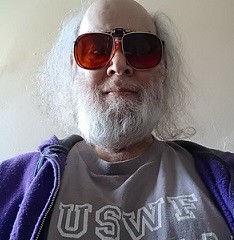Thursday, December 22, 2005
Lament of A Stranded Union Man
Livery cab drivers parked in the bus stop hawked their services, promising stranded subway riders a trip down to 34th Street for only ten bucks a head, so they claimed. Another driver just kept shouting "Downtown!" to whomever passed by, and then returned to chatting in Spanish with one of his fellow entrepreneurs.
A small group of striking transit workers huddled on the street above the locked gates of the 207th Street station, normally the end, and the beginning, of the line on that A train about which Duke Ellington advised us to ride to Harlem. A woman passerby signaled her support for the strikers, and they thanked her, but they then continued a chatty discussion which sounded like a gossip session at a private club.
These strikers carried signs saying something about safety for riders and transit workers. Many spry would-be subway riders marched up Broadway to get to the 225th Street station on the Metro-North Railroad, which is not on strike, to catch special shuttle trains to Grand Central Station. But not everyone was hiking uptown, as there were a few women with canes, and not that old, headed in different directions.
The local McDonald's was empty. I was the only customer when I went in, with only one person taking orders behind the counter (the one person making the sandwiches still got it wrong). This was not a good time for them to reduce the number of items on their Dollar Menu.
A longtime friend of mine, many years my junior, called me last night to say he had been bicycling between Manhattan and the Bronx to see his family and for work, and had been besieged by young Latinos asking for a few bucks for cab fare. These were not con artists, he explained, but people who normally had to cut corners just to pay the subway fare, and now they had to pay even more to find another way to get to where they needed to go. My friend predicted that if this strike goes on much longer, especially through Christmas and New Year's, that there will be riots in these types of communities, and not exactly popular uprisings to support the strikers.
The transit workers, represented by Local 100 of the Transport Workers Union, certainly have many valid grievances. Juan Gonzalez, the old Columbia radical and Young Lords Party leader who now is a columnist for the New York Daily News, outlined many of the harsh practices of the Metropolitan Transportation Authority (MTA) which have infuriated many of these workers. There are about 34,000 transit workers, and he wrote, "Local 100 President Roger Toussaint has repeatedly complained that the MTA issued a phenomenal 15,000 disciplinary actions against his members last year."
The MTA's negotiating tactics also seemed designed to provoke an illegal strike. As reported in the New York Times, the MTA proposed a new giveback to the union not previously on the table shortly before the old contract was set to expire:
But then, just hours before the strike deadline, the authority's chairman, Peter S. Kalikow, put forward a surprise demand that stunned the union. Seeking to rein in the authority's soaring pension costs, he asked that all new transit workers contribute 6 percent of their wages toward their pensions, up from the 2 percent that current workers pay. The union balked, and then shut down the nation's largest transit system for the first time in a quarter-century.
Yet for all the rage and bluster that followed, this war was declared over a pension proposal that would have saved the transit authority less than $20 million over the next three years.
If it was the MTA's intention to provoke an illegal strike, they succeeded. But if it was the strategy of the union to rally the masses of this old school union and working poor town to their side, they have grossly failed.
We now have a three-way fight: 34,000 transit workers vs. a handful of obscure MTA bureaucrats and fat cat politicians vs. 7 million riders.
The worst hit are the poor, including the lowest income workers, who are forced to spend much extra to get to work, endure price-gouging by cabs, especially from the lightly-regulated livery cabs in the poorer neighborhoods where the yellow cabs do not go, or to lose income or even their jobs if they remain at home. No one asked then if they thought a transit strike was proper at this time, and no organization helped them create any strike fund.
Support, the TWU leaders fail to grasp, is a two-way street. The average subway riders regularly complain of rude service by transit workers, subway doors shut in their faces, yelling and sneering at passengers, stops skipped on bus routes so drivers get done faster despite people waiting in bus stops to be picked up, etc., etc., every day.
The TWU couldn't even organize a city-wide support rally now if they wanted to; no one could get to it.
Plus, the timing -- crucial to any fight -- is all wrong. It is the TWU, and not the corrupt and miserly MTA, which is compared to the Grinch this holiday season, a compelling if clichéd portrayal.
Instead of acting as some sort of vanguard for workers -- this is Roger Toussaint, not L'Ouverture -- the TWU's tactics have only served to unite their enemies and divide their potential friends.
Now the TWU is being fined $1 million a day for violating the state's draconian Taylor Law, enacted after the 1966 transit strike. Everyone in New York knows all about this law, so the TWU can hardly complain that these fines will bankrupt it in a few days.
Toussaint may just be leading his troops into another PATCO fiasco. Although the transit workers will not all be fired as Reagan did to the air traffic controllers, Toussaint faces his local being taken over by the TWU's international body (which is not supporting this strike), the local quickly being without funds, and the contract dispute being settled by binding arbitration, which the TWU opposes since it surely will not yield favorable results for the workers. At the same time, each striking worker is being fined two days' pay for each one day out on strike, in addition to losing that day's wages.
Toussaint is due in court today, facing fines and possible jail time himself, although the latter is not likely. He is being represented by union attorney Arthur Schwartz, yet another old Columbia radical.
There also is a group of strikers outside the nearby bus terminal in Inwood. Sometimes a chant is started, "No contract, no work," but then it quickly dies out. Occasionally jeers arise as some manager or maybe a scab drives onto the premises. But they stand in and around another bus stop, trying to keep warm in the freezing temperatures and the even more frigid atmosphere in the city they have thrown into chaos.
In boxing, the old adage is to hit and not get hit. So far, the MTA, usually almost universally hated in this town, is way ahead on points. The ref is looking into the eyes of the union brass to see if this fight should be stopped. If they lose, it will be much tougher for any union or group of workers to make it here, and if you can't make it here, you can't make it anywhere.
I had to postpone a doctor's appointment today because I couldn't get there without risking paying some absurd fare. I'm just a union man, too, a member of the National Writers Union, Local 1981, UAW. At least I can mainly work from home, which, I guess, is also one of the benefits of being an old Columbia-educated radical myself.
But there is a media blackout, and thus the TWU is doing little to rally the public to its side. Its little-read web site, http://www.twulocal100.org/ , has a three-month Alexa ranking far lower than this one-man blog, only updated in the last month, although theirs has had huge traffic the past few days. But it reads like the propaganda of some government-controlled organ.
The NY Times wrote about a crucial conference call Wednesday between Toussaint and "more than a dozen union leaders." They "asserted that Mr. Toussaint's demand to have pensions dropped from the talks was fair and reasonable. What they did not do was declare support for the strike.
"Privately, in the conference call on Wednesday afternoon, they had warned Mr. Toussaint that the fines, public anger and contempt citations from the strike could be disastrous."
Another couple of surveys, which I am searching out, showed that the majority of the public supported the union's demands, but that a majority also thought the strike was not worth it. That proves that the union divided their allies and that the strike, and not the attack on pensions for new hires, became the crucial issue.
This is what happens when you pick a fight you cannot win.
Hit and not get hit -- the TWU needed someone like Buddy McGirt or Dan Birmingham in their corner, not the tired ideologues of a defunct movement.
2 Comments:
Wonderful piece. Things may get very ugly in the next week or so if this isn't resolved. It's hard to imagine the MTA--since they've uncharacterisically got public support this time--willingly conceding much. And Toussaint seems like a real hardball player, so I don't think the union will compromise very easily. Something's got to give.
By , at 7:01 PM
Thanks. Obviously the union blinked. The MTA may back down a little on the pension issue, if the mainstream media reports are to be believed.
But there is a media blackout, and thus the TWU is doing little to rally the public to its side. Its little-read web site, http://www.twulocal100.org/ , has a three-month Alexa ranking far lower than this one-man blog, only updated in the last month, although theirs has had huge traffic the past few days. But it reads like the propaganda of some government-controlled organ.
The NY Times wrote about a crucial conference call Wednesday between Toussaint and "more than a dozen union leaders." They "asserted that Mr. Toussaint's demand to have pensions dropped from the talks was fair and reasonable. What they did not do was declare support for the strike.
"Privately, in the conference call on Wednesday afternoon, they had warned Mr. Toussaint that the fines, public anger and contempt citations from the strike could be disastrous."
Another couple of surveys, which I am searching out, showed that the majority of the public supported the union's demands, but that a majority also thought the strike was not worth it. That proves that the union divided their allies and that the strike, and not the attack on pensions for new hires, became the crucial issue.
This is what happens when you pick a fight you cannot win.
Hit and not get hit -- the TWU needed someone like Buddy McGirt or Dan Birmingham in their corner, not the tired ideologues of a defunct movement.
By Eddie Goldman, at 6:43 AM
2 comments Tweet
















